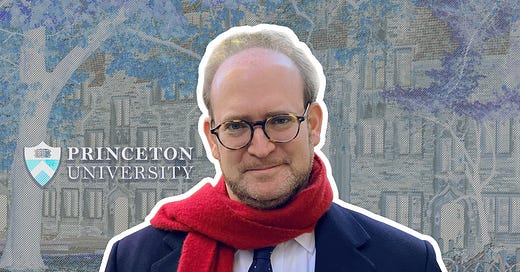The End of Tenure: What Princeton Did to Joshua Katz Was a Warning
Faculty at every institution, including tenured professors, have been put on notice.
Reality's Last Stand is a reader-supported publication. All articles are free, so if you enjoy this content or find it useful, please consider becoming a paying subscriber, or making a one-time or recurring donation. Your support is truly appreciated. Thank you!
Joshua Katz, Princeton’s most eminent linguist and classicist, according to Michael Flower, then-Chair of the Classics department, was “a teacher of unparalleled abilities.” Katz was also the only faculty member able to teach not only Latin and Greek, but also Middle Egyptian, Syriac, Cherokee, Hittite, Tocharian, Old Irish, Old Norse, and Classical Armenian. Nonetheless, as of May 23, 2022, students at Princeton have lost the opportunity to learn from this truly exceptional professor.
In case you missed some details, in 2020 Katz wrote an essay for Quillette in which he mentioned the Black Justice League, a campus group that was active from 2014-16 (and whose members are now in their mid-late 20s). In his critique, he referred to it as “a small local terrorist organization that made life miserable for the many (including the many black students) who did not agree with its members’ demands” when it was active on campus. He also criticized a series of “anti-racist” policies proposed by Princeton professors, which, he argued, “if implemented, would lead to civil war on campus and erode even further public confidence in how elite institutions of higher education operate.” While he agreed with many of his colleagues’ ideas, he objected to policies using race to determine pay and benefits, and to the formation of a committee in charge of defining what constitutes racism and that would, in their words, “oversee the investigation and discipline of [any member of the faculty’s] racist behaviors, incidents, research, and publication.”
“Racist slurs and clear and documentable bias against someone because of skin color are reprehensible and should lead to disciplinary action, for which there is already a process,” Katz wrote. But “is there anyone who doesn’t believe that this committee would be a star chamber with a low bar for cancellation, punishment, suspension, even dismissal?”
After Katz publicly objected to his colleagues’ proposals, a series of thoughtful, evidence-based rejoinders were published in the Daily Princetonian and elsewhere. Each essay produced compelling reasons and facts rebutting Katz’s assertions, their authors picking his points apart one by one, skillfully dismantling his arguments and exposing his wrongheadedness.
Just kidding.
What actually happened was that campus petitions condemning Katz were swiftly circulated, and Twitter lit up with denunciations from students, faculty, and alumni claiming he was a racist. An alumna also opined that there should be a “formal inquiry,” and one Princeton professor described Katz’s opinions as “race-baiting, disguised as free speech” and an “act of reckless endangerment” so great that Princeton’s president, Christopher Eisgruber, should use his power to “condemn.” Eisgruber, for his part, “personally and strongly” objected to what he referred to as Katz’s “false description of a Princeton student group as a ‘local terrorist organization.’”
“Anti-racist” activists denounced Katz. Free speech advocates defended him.
Meanwhile, as the controversy raged on, the student paper, The Daily Princetonian, went on a dirt-digging expedition and unearthed an unpaid year-long leave of absence that Katz began in the summer of 2018. Further excavation, which included contacting alumni and faculty, uncovered Katz’s 2006–7 consensual relationship with a female student.
At the time of that relationship, faculty and students were permitted to engage in romantic relationships—except in cases of supervisory or pedagogical conflicts. Since Katz’s relationship fell into that category, he went through the university’s disciplinary process, resulting in the unpaid leave of absence. Not only did the woman in question not initiate the 2018 disciplinary proceedings (it resulted from an unrelated party reporting the relationship more than ten years after the fact), she declined to participate. For the 2021 Princetonian piece, the woman (referred to as “Jane” in the article), refused reporters’ interview requests.
Unable to find anyone to accuse Katz of sexual harassment, student reporters managed to find 18 people—of the 56 they contacted—who were willing to give comment, including three alumnae who spoke out against Katz. One complained to reporters that when she was Katz’s student, he would sometimes talk to her before and after class. She neither lodged a formal complaint nor told Katz that these conversations bothered her. And she admitted to reporters that they were not of a sexual nature. The other two alumnae each told reporters that although they had gone out to dinner with Katz, he never engaged in any sexual behavior toward them. However, he was, they complained, excessively friendly.
“There was no quid pro quo, no attempt to proposition me, and no physical assault,” one told The Daily Princetonian. Nonetheless she alleged that his friendliness resulted in “considerable distress and anxiety.” The other woman complained that Katz had given her chocolate and small gifts. After graduation, she reported his gift-giving to an administrator—while at the same time, apparently, still communicating with Katz, yet not telling him she was not interested in his friendship. (Months later, an administrator told her the case had been closed.)
In February of 2021, The Daily Princetonian published all these claims in a lengthy and unflattering piece that mentioned and linked Katz’s Quillette article along with Eisgruber’s denunciation. According to Katz’s wife, Solveig Gold, after the publication of the piece, “Jane,” who it turns out worked for both Hillary Clinton and Barack Obama, contacted the school to accuse Katz of having first dissuaded her from seeking therapy during their 2006–7 relationship, and then from participating in the 2018 investigation. In conveying her accusations, “Jane” admitted that her complaints resulted from two things—reading the hit piece in The Daily Princetonian (which referenced his decidedly non-progressive political views) and learning that he was engaged to be married.
Clearly, the romance between Katz and “Jane” was unwise. It also appears to have been a union of two unstable personalities, each of whose individual dysfunction was aggravated by a relationship on which both partners relied as a familiar, yet ineffective, coping strategy.
I met Katz in the fall of 2021. By then, he was already embroiled in a new investigation of that old relationship—and neither time was his lawyer permitted to participate in the process. If neither the sudden materialization of brand-new allegations (for which Katz told me he provided exculpatory evidence) nor the accuser’s openly acknowledged reasons for making them gave the university pause, perhaps the psychiatric report should have. A professional evaluation revealed that Katz is not only not a controlling person, but that he has a tendency to be overly-accommodating, including by being willing to accept blame for things for which he knows he is blameless.
When Princeton fired him in May, the university announced that his termination was purely a result of “Jane’s” allegations and had nothing to do with his political views.
Few free speech advocates are buying it.
Imagine for a moment that Katz reliably sang from the “anti-racist” songbook. Instead of criticizing the policies to which he objected in his Quillette article, imagine that he had been among the professors calling for them. And imagine that a conservative student paper wanted to take him down for favoring things like race-based pay (which, as an aside, constitutes race-based discrimination and is not legal) along with the creation of a committee to define and adjudicate what counts as racism on campus. Imagine that the conservative student paper uncovered his 2006–7 relationship and those reporters learned that his ex-lover had refused to participate in the related disciplinary hearing and that he had already been sanctioned by taking an unpaid year-long leave of absence. And imagine that although the woman refused to speak ill of him to student reporters, others made exactly the complaints that were published about him in the hit piece. But this time, imagine that what prompted the effort to take him down were his ultra-progressive views.
And now imagine that his accuser was a Trump supporter. Upon learning that Katz had not only become a leftist but was engaged to be married—to a different former student, no less—imagine that she contacted the administration and alleged that he had dissuaded her from getting therapy while they were together and discouraged her from participating in the subsequent disciplinary process.
Would a second investigation about that relationship materialize? I doubt it. Would the administration take seriously the new, out-of-the-blue claims made by a Trump-supporting jilted lover who openly declared that her decision to make new allegations arose because she learned that Katz holds political beliefs she abhors and was about to marry someone else? Hard to picture. And while it seems unlikely that a progressive Katz would get to the point of needing to provide exculpatory evidence or a psychiatric report detailing his passive personality, if he did, would a leftist, tenured Professor Katz have been fired?
In real life, before the supposed investigation of Katz’s already-adjudicated relationship, Eisgruber, who later personally recommended Katz’s termination to the Trustees, had publicly rebuked Katz: “While free speech permits students and faculty to make arguments that are bold, provocative, or even offensive, we all have an obligation to exercise that right responsibly,” he’d written, adding, “Joshua Katz has failed to do so.” In real life, a university spokesperson, Ben Chang, had announced that the administration would be “looking into the matter” of Katz’s offensive speech. And in real life, a Princeton website about “Systemic Racism” at the university presented the Black Justice League as a laudatory example of “anti-racist” protest while presenting Katz, who was, at the time of the website’s creation, a sitting professor at the university, as a hateful example of “what crosses the line between free speech… and racist expression.” That website was part of the required Freshman orientation.
As it turned out, Katz was wrong in his Quillette essay about at least one thing: the formal constitution of a new committee was unnecessary for Princeton’s bar to hit the floor.
Princeton’s treatment of Katz was a warning to every heterodox thinker on every campus across the country. While not every professor’s past mistakes will have already risen to the level of sanction, today’s dominant moral culture delights in relitigating any past transgression viewed as having been too leniently addressed, and it revels in interpreting past words and behaviors through a present, and unforgiving, moral lens.
Faculty at every institution, including tenured professors, have been put on notice. If they refuse to sing all the required songs—loudly, and with perfect pitch—they will live under a perpetual Sword of Damocles.
Pamela Paresky is a psychologist and Visiting Fellow at the SNF Agora Institute at Johns Hopkins, where she is teaching “Habits of a Free Mind: The Art of Civil Disagreement” during the Fall semester. She serves as a Senior Scholar at the Network Contagion Research Institute and frequently writes for Psychology Today. Her “Habits of a Free Mind” newsletter is on Substack.
Reality’s Last Stand is a reader-supported publication aimed at keeping you informed on the issues and news surrounding the rise of sex denialism and gender ideology throughout society.
If you enjoy this content or find it useful, please consider becoming a paying subscriber, or making a one-time or recurring donation. Your support is truly appreciated.









Perhaps Dr. Katz will soon be found with other esteemed colleagues at University of Austin.
Universities used to be the front lines of free speech. Now they are the front lines of thought and speech control.
False allegations of sexual misconduct only make it more difficult for legitimate victims to come forward. The Woke Army is effectively protecting predators on college campuses.